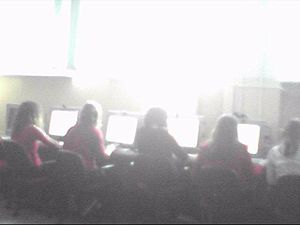While early indications for the Microsoft's latest phone OS seem less than promising it does appear that they have a big hit in the Kinect. There has been a lot of press on this item and if you're Microsoft than you have to be pleased with the reception. The XBox 360 is getting a bit long in the tooth at this point and finding a way to excite shoppers about the platform heading into the always important holiday shopping season is a big win for them. This is very analogous to what Nintendo was able to do when they released the Wii, which sans the Wii controller was really just a minimally upgraded and repackaged Game Cube. In both cases the controller and what it makes possible are more important than the technology in the console. In fact, in the case of the Kinect I'm more interested in what significance it has when used on platforms other than the 360.
If we look at the history of human computer interaction there have been several steps. Roughly speaking we went from toggling information in via
- Switches or punch cards to
- Keyboard entry to
- Mouse and keyboard to
- Touch screens
Each step made it easier to interact with computers and widened the audience for them.
There have been other specialized controllers of course. the joystick, track ball, and the previously mentioned Wii controller to name just a few. From a technical perspective the Kinect is a much more complicated and interesting device than any of those as the image below shows.
According to Wikipedia the Kinect is essentially a combination of software and hardware that makes it possible for the XBox 360 to track multiple points (AKA body parts) on multiple people in 3D space. This in turn allows game designers to create games that require only input that a human can provide by standard movements . This means that players could for instance interact with a virtual world via detailed 3D avatars. From a gaming perspective the possibilities are extremely intriguing and game designers are already putting the technology to use.
You could argue that the Kinect isn't a controller at all in the sense that it isn't something you hold in your hand; and that is the revolutionary thing about it. When combined with speech recognition it allows human beings to interact in fairly complicated ways with computers while never having to touch a controller of any kind. Which is why I think that the XBox-360 is just the beginning. This device, or it's descendent's are likely going to start popping up in a lot of different contexts over the next few years. The technologies involved aren't that expensive and the CPU power needed to drive the software that fills in the gaps and knits things together isn't either.
So what is possible? If you search on YouTube for "Kinect Hack" you'll come across many videos that show what people are up to already with the Kinect. A couple that I especially like are...
Kinect Augmented Reality
Kinect 3D Video Capture
In the case of the second video I'm intrigued by the possibility of combining two or more similar devices to get a true three dimensional mapping of a person or place that could than be displayed and explored. Along those lines here is another YouTube video where that sort of thing is discussed...
Multiple Kinect Coordination Ideas
And finally, one more that actually shows some early results of two Kinect's working together...
Two Kinects Working Together
It will be VERY interesting to see where this all leads.
For as long as I can recall Microsoft has claimed to be a technology innovator. In reality they've tended to be much better known for making refinements on ideas first popularized by others. In the case of the Kinect they clearly have a revolutionary and innovative product.
You could argue that the Kinect isn't a controller at all in the sense that it isn't something you hold in your hand; and that is the revolutionary thing about it. When combined with speech recognition it allows human beings to interact in fairly complicated ways with computers while never having to touch a controller of any kind. Which is why I think that the XBox-360 is just the beginning. This device, or it's descendent's are likely going to start popping up in a lot of different contexts over the next few years. The technologies involved aren't that expensive and the CPU power needed to drive the software that fills in the gaps and knits things together isn't either.
So what is possible? If you search on YouTube for "Kinect Hack" you'll come across many videos that show what people are up to already with the Kinect. A couple that I especially like are...
Kinect Augmented Reality
Kinect 3D Video Capture
In the case of the second video I'm intrigued by the possibility of combining two or more similar devices to get a true three dimensional mapping of a person or place that could than be displayed and explored. Along those lines here is another YouTube video where that sort of thing is discussed...
Multiple Kinect Coordination Ideas
And finally, one more that actually shows some early results of two Kinect's working together...
Two Kinects Working Together
It will be VERY interesting to see where this all leads.
For as long as I can recall Microsoft has claimed to be a technology innovator. In reality they've tended to be much better known for making refinements on ideas first popularized by others. In the case of the Kinect they clearly have a revolutionary and innovative product.
Image via Wikipedia
















